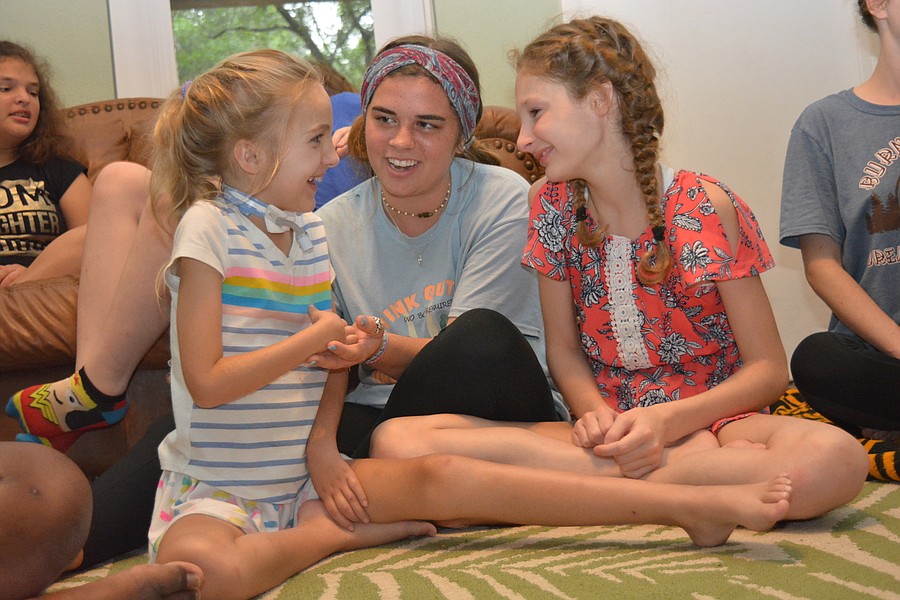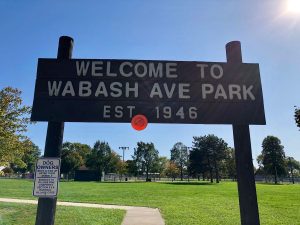
“Your honor, there are so many girls named Ashley.” That’s what I told the judge.
“Your honor, I am a doctoral student at the University of Illinois, and I have been spending quite a bit of time in places where young people go during their out-of-school hours."
This was during voir dire–a French term commonly applied in courtrooms in the United States to describe the process wherein legal counsel, the judge, or both, examine members of a jury pool, one at a time, to determine who will be selected for a seat on the jury and who will be excused.
It was 1996. I was a graduate student, working on my Ph.D. dissertation in the field of special education at the University of Illinois at Urbana-Champaign. I had received a summons to appear for a criminal trial in Champaign County District Court. I thought it could be interesting to sit on a jury for the first time in my life, so long as the trial wasn’t going on for too many days. Once we were all assembled and filled out questionnaires, the court officials excused some citizens with very compelling reasons before we even got to voir dire: for instance, if someone had a chronic health condition that would make it difficult to sit still for several hours, or had a relative who worked with a member of the prosecutor’s family or the defense attorney’s family.
There were 35 to 40 of us remaining. The officials walked us somewhat ceremoniously into the courtroom, where the seats were much more comfortable than the folding chairs where we had been sitting in the check-in area up to this point. Before calling us up individually, the judge informed us what the case would be all about. The defendant, a man in his late thirties, was charged with three counts of sexual molestation of a child. The time frame was during a sleepover at their home. The defendant, a single parent, had a daughter, aged eleven; the alleged victim was the same age and was one of the daughter’s best friends.
 The courthouse was in the city of Champaign but the location where the alleged crime took place was in a nearby town called Rantoul, about 10 miles from Champaign. I knew a bit about the town, for reasons I shall explain shortly, and that I had to explain as well to the judge. Its civic and economic life had revolved, since the launch of the Army Air Corps in the 1920s, around Chanute Air Force Base. The closing of the base in 1993 had jolted the community, shuttered numerous businesses, led to a decrease in population, and left many of the remaining townspeople economically and psychologically devastated.
The courthouse was in the city of Champaign but the location where the alleged crime took place was in a nearby town called Rantoul, about 10 miles from Champaign. I knew a bit about the town, for reasons I shall explain shortly, and that I had to explain as well to the judge. Its civic and economic life had revolved, since the launch of the Army Air Corps in the 1920s, around Chanute Air Force Base. The closing of the base in 1993 had jolted the community, shuttered numerous businesses, led to a decrease in population, and left many of the remaining townspeople economically and psychologically devastated.
In addition to telling us what the charges were, the judge presented the counsel on both sides, and gave us the names of the defendant, his daughter, and the alleged victim, as well as the arresting police officer and anyone else he anticipated would be taking the witness stand. The defendant, a white male, was present for this part of the proceeding, and the judge pointed him out to us. He was on the small side, a white guy, regular build, short brown hair with some facial hair.
As voir dire began, the judge called each juror forward individually, asking them to take a seat just below the judicial bench. He began by asking each one if they knew any of the people he had named. A couple of jurors were excused on the grounds of knowing someone related to the parties, but not many. We jurors came from all over the county. The population of Rantoul, less than 15,000, was at most 10% of the county.
After the initial round of questions from the judge, he turned each potential juror over to the attorneys on both sides. They asked questions designed to identify bias and to determine who would be able to listen with an open mind. For instance, “Would you consider the testimony of an 11-year old girl to be credible and reliable?” “Are you comfortable thinking about the possibility that an adult may take advantage of a young person sexually?” “Would you maintain an open mind and weigh the evidence that comes before the court without allowing your own assumptions to get in the way?”
Soon it was my turn. The judge began by asking me if I knew any of the people he had named. Listening to the proceedings, I had been ruminating for quite a while and experiencing some consternation regarding just how I would answer this question. I expected my answer would be unique—not only distinctively different from any of the others in this jury pool but perhaps different from any potential juror who had ever come before the judge in any criminal case.
When he asked me that first question, I was ready. “Your honor, I am a doctoral student at the University of Illinois, and I have been spending quite a bit of time in Rantoul. More specifically, I have been spending time in places where young people go during their out-of-school hours. I mean kids between the ages of six and twelve especially. I think I need to explain to you what I have been doing and whyI am not able to easily answer your first question.”
I had captured the judge’s attention, and his curiosity. “Yes, please say more about this.”
“My field is special education, and my research is related to the participation of children with disabilities in youth programs and recreation. It just so happens that, for my doctoral dissertation, I chose Rantoul, over a year ago, as the one community I would study in great depth.
“The research I do is known as a qualitative case study. It requires the researcher to spend time in the field, observing and to some degree participating in the activities being studied. “
“OK, go on.”
“You mentioned that one of the girls who will testify is named Ashley.”
“Yes, the daughter of the defendant is named Ashley. Her testimony will be very important in this trial. Do you think you may have met her?”
“Well, your honor, during my study, I have gotten permission to spend time at the Youth Recreation center on a regular basis, and with a Brownie troop that meets weekly, and a Junior Girl Scout troop that meets weekly, and I helped to coach a coed team in the youth baseball league run by the town. I have also carried out observations in some camps and other recreational spaces.. As an important part of my research protocol, I always promise confidentiality to the staff and volunteers I meet, and of course to the children and the parents. And so I go out of my way not to even learn any of the children’s last names. Anyway, to get to my point:, I have met several girls named Ashley. So many girls in this town are named Ashley. I just don’t know if any of them are the Ashley that’s a part of this trial.”
The judge turned to the defendant for the first and only time during the entire voir dire. “Does your daughter go to the Recreation Center? Is she a Girl Scout? Play baseball?”
The defendant responded, “Ask him if he’s observed cheerleading. That’s her only afterschool activity.”
The judge turned to me. “Mr. Fink, have you observed any of the local cheerleading squads?”
“No, I haven’t,” I answered. The judge turned back to the defendant. “She’s not involved in any other recreational activities, sports, camps?”
He shook his head emphatically no. The judge turned back to me. “Thank you for bringing this up. It appears you have not met the Ashley who will testify in this trial.”
The prosecution and defense attorney asked me very little if anything after that. I was accepted and seated as a member of the jury.
The trial lasted for two days and in the end, we were a “hung jury.”
I still think back about how the judge posed a seemingly simple and straightforward question during voir dire, but got back a lengthy exposition about qualitative research methods.I supposed the judge chalked to it up to the perils of having a bunch of grad students mucking up his jury pool. If he ever recollects or describes this scene for others, I do hope he recalls the grad student in question as having provided him a suitably erudite disquisition.
I also like to imagine that whenever the judge meets someone named Ashley, a recollection comes to his mind and a sly smile crosses his face.
Dale Borman Fink retired in 2020 from Massachusetts College of Liberal Arts in North Adams, MA, where he taught courses related to research methods, early childhood education, special education, and children’s literature. Prior to that he was involved in childcare, after-school care, and support for the families of children with disabilities. Among his books are Making a Place for Kids with Disabilities (2000) Control the Climate, Not the Children: Discipline in School Age Care (1995), and a children’s book, Mr. Silver and Mrs. Gold (1980). In 2018, he edited a volume of his father's recollections, called SHOPKEEPER'S SON.







Thanx Dale for sharing this fascinating story of your jury service experience. I’m sure the judge did get more from you than he bargained for and I and hope he has remembered that dedicated and articulate young grad student!
And thanx Dale for suggesting this prompt!
A “jury of your peers” does get an odd mix of people, based on your description, Dale. The hung jury sounds frustrating since you describe that based on the those “elderly” (I put the term in quotes, since one was in his 70s, as we are now) farmers, who couldn’t imagine a girl being molested without torn clothing or some other outward manifestation, though the charge was unwanted touching. A lack of empathy, or ability to actually understand what happened, it seems to me. A terrible outcome for the poor victim.
You have a very detailed recollection of this process—you remembered a lot more than I, but it sounds like a very similar process of voir dire that I experienced. I can imagine that your answer was indeed unique and the judge never forgot the gist of it—especially when meeting anyone named Ashley.
This is a very interesting story, Dale. But I am haunted by the fact that the defendant got off for the reason you stated.
The lines regarding the actual outcome of the trial were an afterthought. I thought readers might like to know what transpired. But those lines clearly (based on the feedback) distracted from the main thrust of the narrative. If you come back to this site, you will see that I have revised the story and removed the outcome of the trial.
I find it amusing that you were hoping that your educational pursuits would not interfere with your participation, while I was hoping that mine would get me excused.
Wow: what a great descriptive and detailed retrospective. It makes me feel I have gone blind not only through my own jury duty which I could only describe in a few brief paragraphs, but also have not had any opportunity to leave the judge with a possible memory as well.
Of course, part of your dialogue probably resulted from being a graduate student who is used to answering all questions on the level of an oral Ph.D. exam.
Like Laurie, I was appalled that poor Ashley did not get justice, but since you have rewritten your story, I will focus on the way the judge had to drill down on your interactions with the young people your were involved with during your graduate studies, which happened to include working with the age group and in Rantoul as the girl who had allegedly been molested, which I’m sure was quite a coincidence. And you did work with many Ashleys, just not the one who did cheerleading the summer in question. I bet no one had ever witnessed a voir dire like yours!
Just to be clear: Ashley (the only Ashley in town, I guess, whom I had never met) was the daughter of the defendant; she was not the alleged victim. Her testimony was that her friend had never said a thing about the dad doing anything bad to her, and she did not believe he had.
I love this story, Dale. Your answer to the question about whether you knew anyone involved was so wonderfully thoughtful and informative. And it’s true that in the late ’80s a huge number of girls were named Ashley. My son had 3 Ashleys in his kindergarten class in 1993 – one white, one Black, and one Asian. It was a name that crossed all lines. And I bet the judge has never forgotten your voir dire!
I did first read the story when you had more about how the trial ended. But for those who were upset (Laurie, Betsy), they should be aware that a hung jury means the DA can try the case a second time to a brand new jury, so it wasn’t a situation where the defendant “got off.”
Thanks for explaining about the implications of a hung jury. And thanks for confirming the commonality of families naming their girls “Ashley” during that period of years.
Dale, not only did the court experience intrigue me (love when the judge questioned the defendant) but I was so impressed by your involvement in the community. Such an enriching experience for all. The pics were excellent, the title was too. There should be a song “So Many Girls Named Ashley.”
I’m trying to come up with a tune for that song. I think Lionel Richie (if he’s still around) should sing it! Thanks for commenting on the photos; it was fun to find a lot of potential Ashleys!